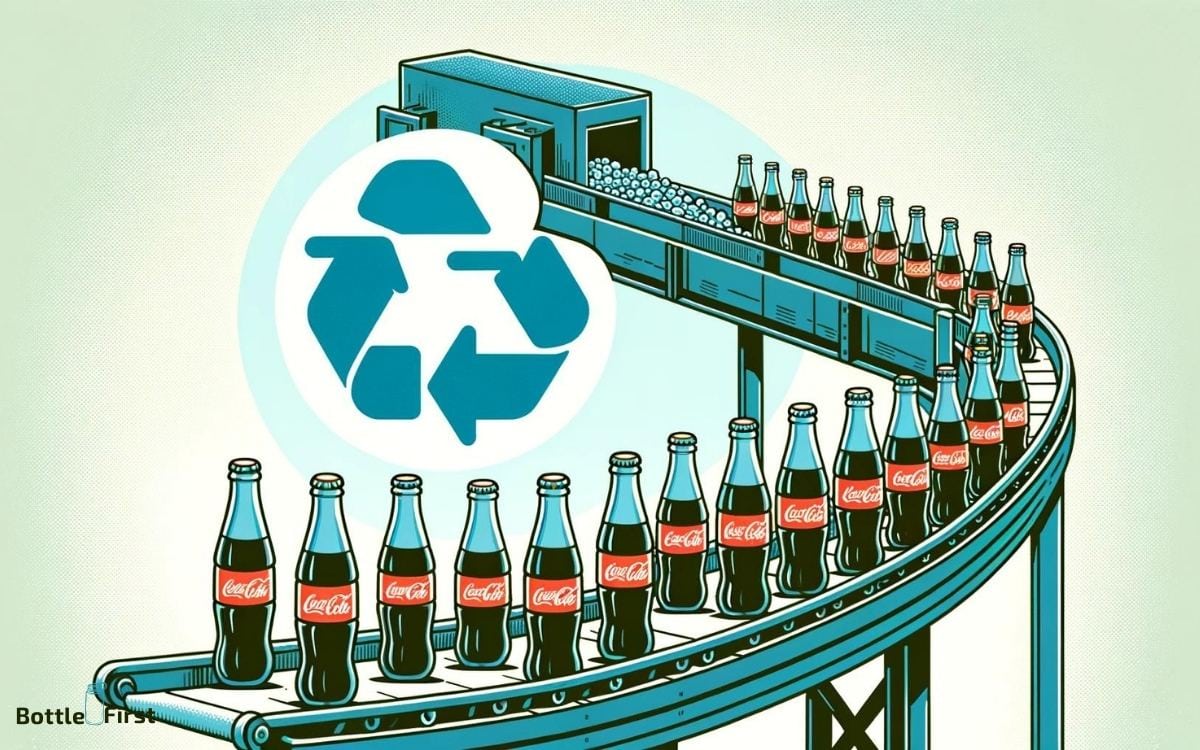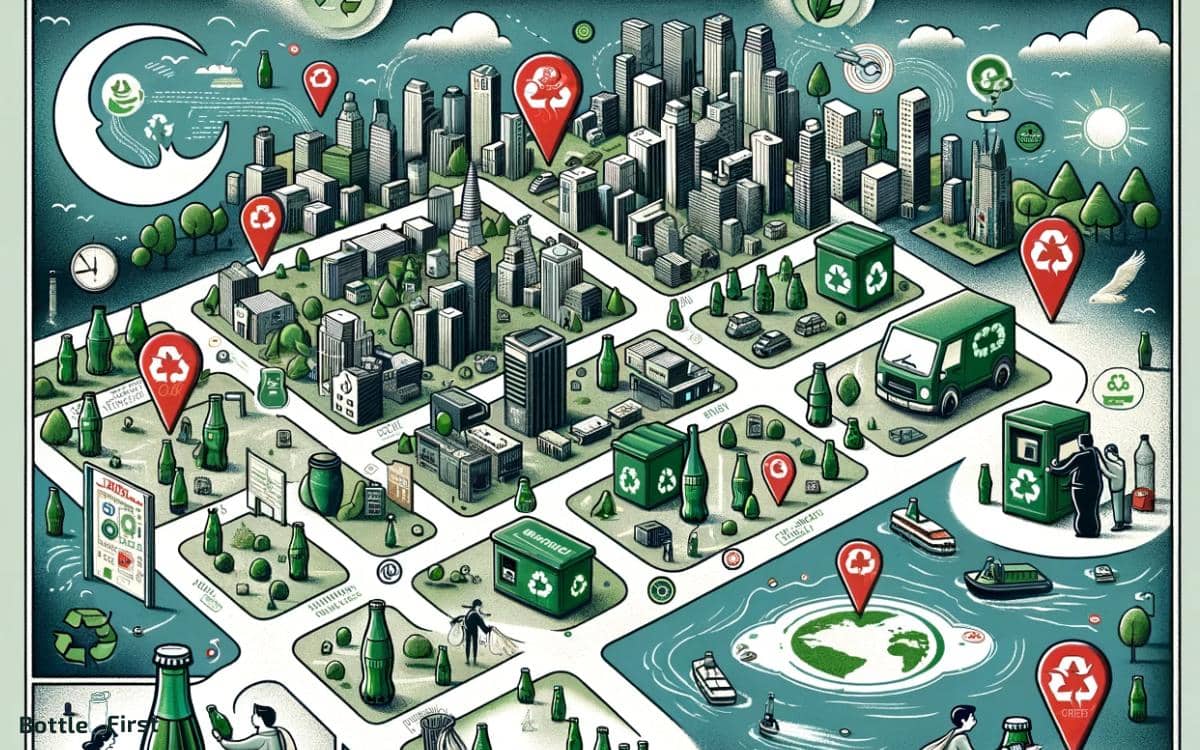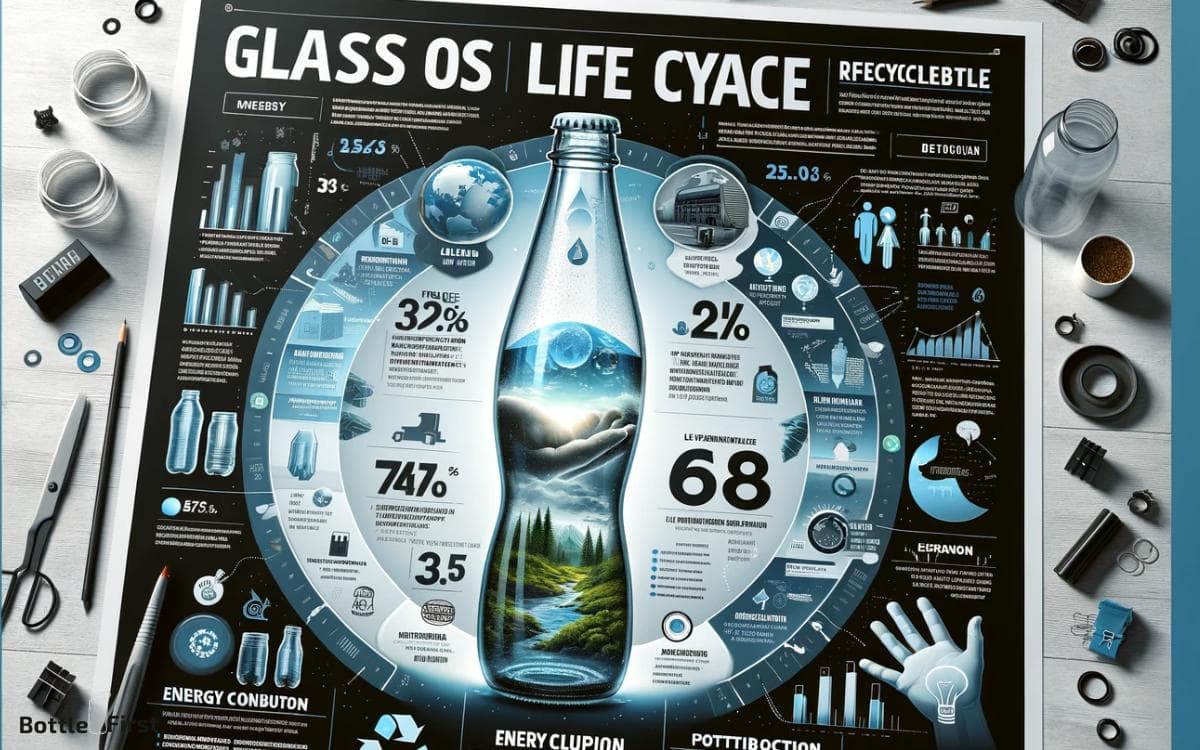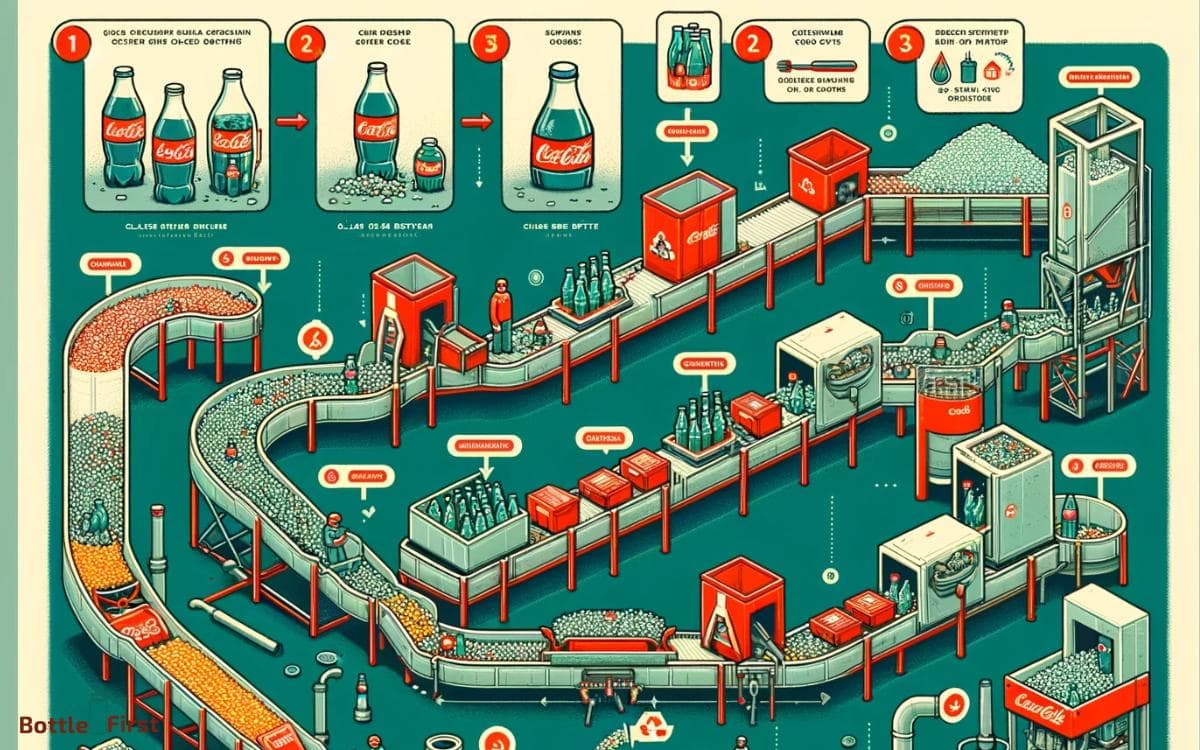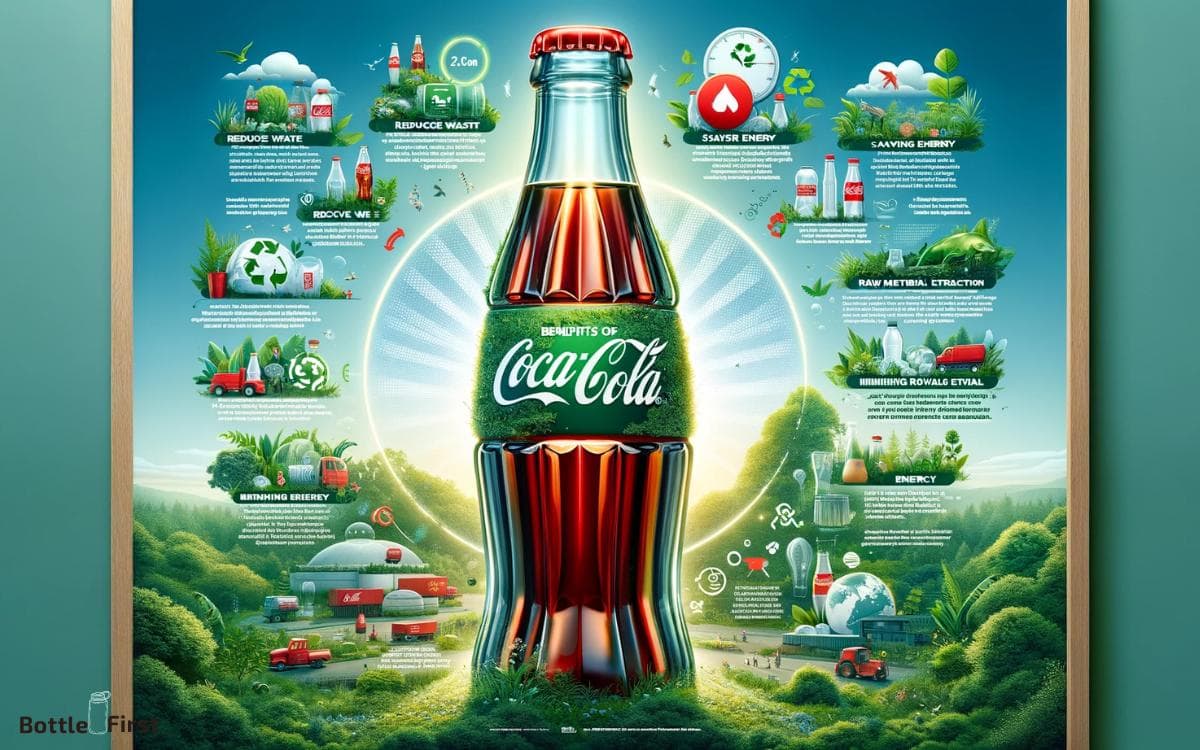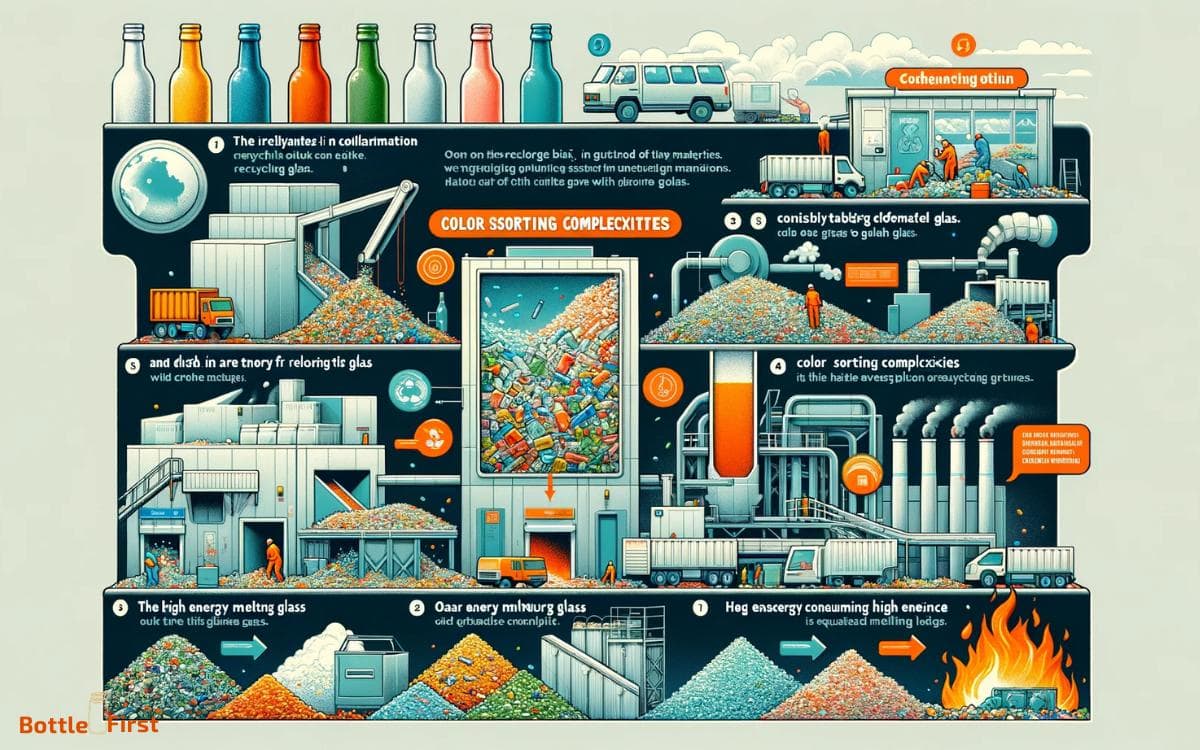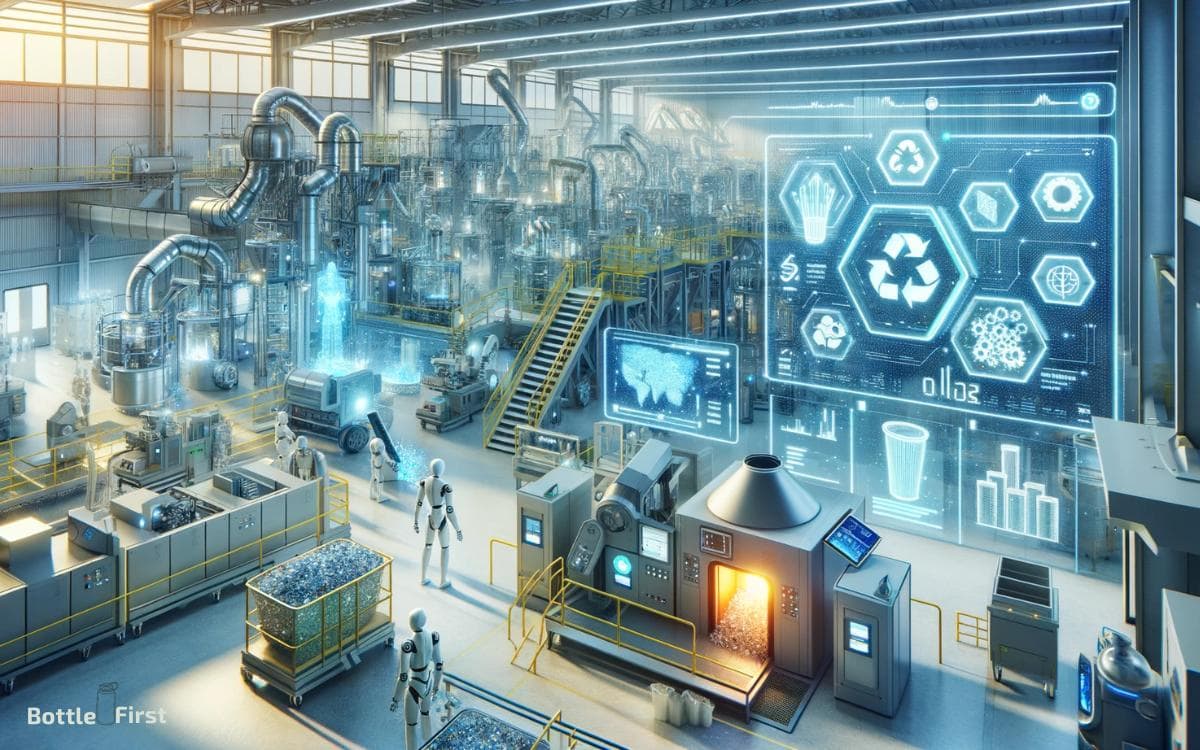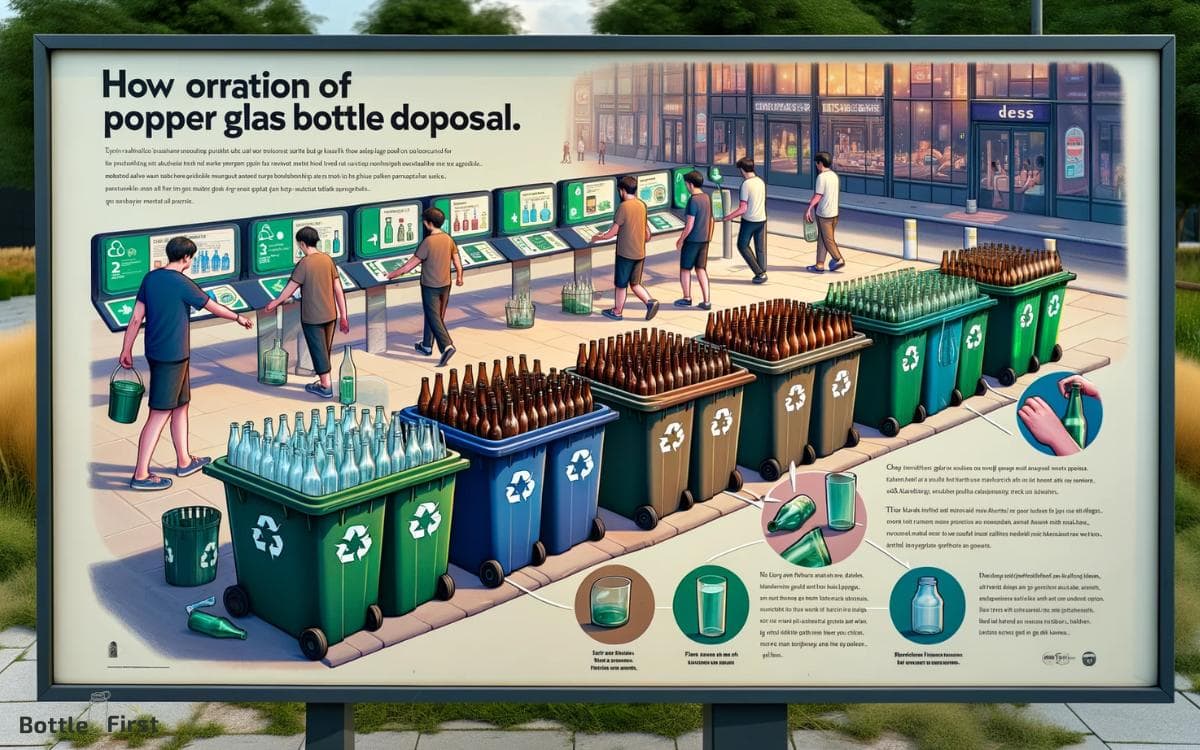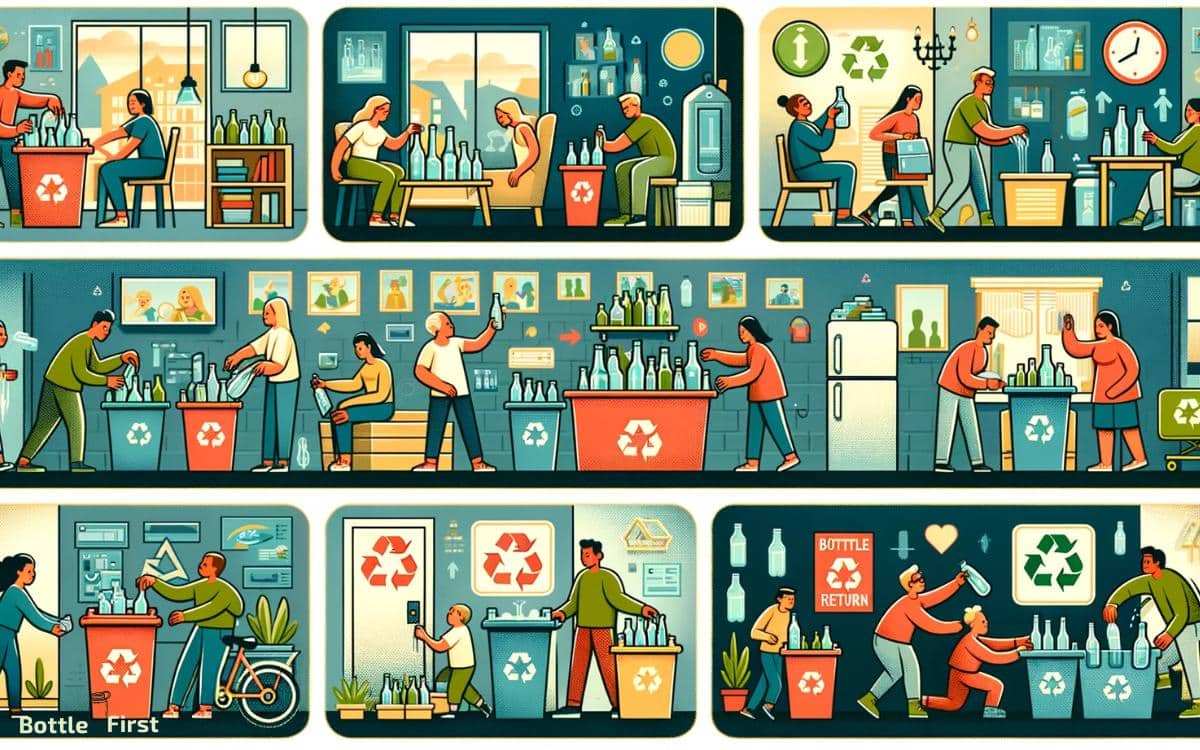Are Glass Coke Bottles Recyclable? Yes!
Yes, glass Coke bottles are recyclable. They can be continuously recycled without loss of purity or quality, making them a sustainable packaging choice.
Recycling glass not only conserves resources but also reduces greenhouse gas emissions and extends the life of glass-producing furnaces.
Glass is one of the most recyclable materials, and this includes glass Coke bottles.
The recycling process involves several steps:
- Collection: Glass bottles are collected from curbside programs, deposit centers, or drop-off locations.
- Processing: The collected glass is sorted by color and cleaned to remove any impurities.
- Crushing: The clean glass is then crushed and melted.
- Manufacturing: The molten glass is molded into new bottles or other products.
Recycling glass has numerous benefits:
- Reduces the need for raw materials
- Saves energy
- Lowers emissions from production processes
- Decreases the volume of waste sent to landfills
Recycle your glass Coke bottles to contribute to a greener future; every bottle returned is a step towards a more sustainable planet.
Key Takeaway
Where to Recycle Glass Coke Bottles
Recycling glass Coke bottles is generally straightforward, as glass is one of the most commonly recycled materials. However, the options for recycling can vary depending on your location.
Here are some general guidelines:
Curbside Recycling Programs:
Many municipalities offer curbside recycling services. Check with your local waste management authority to see if glass is accepted in your curbside recycling program. If it is, you can simply place your glass Coke bottles in your recycling bin.
Local Recycling Centers:
If curbside recycling isn’t available or doesn’t accept glass, look for a local recycling center.
These facilities often accept a variety of materials, including different types of glass. You can typically find these centers listed on your city or county’s waste management website.
Deposit Return Schemes:
Some areas have deposit return systems for beverage containers. This means you pay a small deposit when you purchase a beverage, which is refunded when you return the empty container to a designated collection point. Check if such a scheme exists in your area.
Retail Locations:
Certain grocery stores or retail outlets offer recycling services, sometimes including glass. This is more common in regions with deposit return schemes.
Special Recycling Events:
Some communities host special recycling events for materials that are not routinely collected curbside, including glass.
Environmental Organizations:
Local environmental groups sometimes provide resources or services for recycling items like glass bottles.
Tips for Recycling Glass Bottles
- Clean and Empty: Rinse out the bottles to remove any liquid or residue. This helps prevent contamination in the recycling process.
- Check for Labels: Generally, you don’t need to remove labels on glass bottles as these are burned off during the recycling process. However, check with your local recycling guidelines.
- Sort by Color: Some recycling programs ask you to sort glass by color. If required, separate your Coke bottles accordingly.
Environmental Impact of Glass Bottles
Glass bottles have a significant environmental impact due to their energy-intensive production and potential for long-term recycling.
The production of glass bottles requires high temperatures, contributing to their carbon footprint. However, glass is 100% recyclable and can be recycled endlessly without loss in quality or purity.
This potential for long-term recycling makes glass bottles a sustainable packaging option. Additionally, recycling glass reduces the need for raw materials and the energy required to produce new bottles, further lessening its environmental impact.
Innovations in glass recycling technologies continue to improve the efficiency of the recycling process, making it an increasingly sustainable choice.
As consumer demand for environmentally friendly products grows, the innovation in glass bottle recycling is crucial for reducing the environmental impact of this packaging material.
Glass Coke Bottle Recycling Process
When it comes to the glass Coke bottle recycling process, it’s important to understand the steps involved and the benefits it brings.
Recycling glass Coke bottles not only reduces waste but also conserves energy and raw materials.
Understanding the environmental impact of recycling these bottles is crucial in promoting sustainable practices.
Coke Bottle Recycling
You can recycle glass Coke bottles through a straightforward process that involves collection, sorting, cleaning, and melting.
Once the glass bottles are collected, they’re sorted to remove any non-glass materials. After sorting, the bottles undergo a thorough cleaning process to eliminate any contaminants.
The cleaned bottles are then crushed and melted down to form molten glass, which can be molded into new bottles or other glass products.
This recycling process helps to conserve energy and raw materials while reducing waste and pollution.
Additionally, recycling glass Coke bottles reduces the need for raw materials extraction and the energy required to produce new glass, making it an environmentally friendly choice.
Transitioning to the subsequent section, let’s explore the numerous benefits of glass recycling.
Glass Recycling Benefits
By participating in glass Coke bottle recycling, you can contribute to the conservation of energy and raw materials, as well as the reduction of waste and pollution.
When you recycle glass Coke bottles, you are:
Conserving Energy:
- Recycling glass saves energy as it requires less energy to melt and reuse glass than to create new glass from raw materials.
Preserving Raw Materials:
- Recycling glass reduces the need for raw materials, such as sand, soda ash, and limestone, which are non-renewable resources.
Glass recycling not only benefits the environment but also supports the circular economy by reducing the extraction of natural resources and minimizing the amount of waste sent to landfills.
This sustainable practice aligns with the growing need for innovative solutions to address environmental challenges.
Environmental Impact of Recycling
Participating in glass Coke bottle recycling directly impacts the environment through the reduction of energy consumption and the preservation of raw materials.
The recycling process for glass Coke bottles involves crushing and melting the glass, which requires less energy compared to producing new glass from raw materials.
This reduction in energy consumption leads to lower carbon emissions and helps in the conservation of natural resources.
Additionally, recycling glass Coke bottles helps in diverting waste from landfills, reducing the environmental impact of waste disposal.
By participating in glass Coke bottle recycling, you contribute to a more sustainable and environmentally friendly approach to resource management.
The environmental benefits of glass recycling highlight the importance of incorporating such practices into everyday consumption patterns.
Moving on to the next section, let’s delve into the specific benefits of recycling glass Coke bottles.
Benefits of Recycling Glass Coke Bottles
When you recycle glass Coke bottles, you contribute to reducing the environmental impact of waste disposal.
Glass is 100% recyclable and can be recycled endlessly without losing its quality, making it a sustainable packaging solution.
Environmental Impact of Recycling
When you recycle glass Coke bottles, you significantly reduce the amount of energy needed to produce new bottles, thereby lowering carbon emissions and conserving natural resources.
This has a positive impact on the environment, providing several benefits:
- Energy Conservation: Recycling glass bottles saves around 30% of the energy required in the glass production process, contributing to a lower carbon footprint.
- Innovative Techniques: Advanced recycling technologies continue to emerge, further improving energy efficiency and reducing environmental impact.
- Resource Preservation: By recycling glass bottles, you help conserve raw materials such as sand, soda ash, and limestone, which are finite resources.
- Circular Economy: Embracing glass bottle recycling supports a circular economy, where materials are reused, reducing the need for new resource extraction.
These benefits demonstrate the environmental value of recycling glass Coke bottles, making it an important practice in sustainability efforts.
Sustainable Packaging Solutions
You can make a significant impact on sustainability by recycling glass Coke bottles, contributing to the reduction of carbon emissions and the conservation of natural resources.
Glass is endlessly recyclable without losing its quality, making it a sustainable packaging solution.
By recycling glass Coke bottles, you prevent the need to extract raw materials for new glass production, conserving energy and reducing greenhouse gas emissions.
Additionally, recycling glass reduces the amount of waste that ends up in landfills, promoting a circular economy and minimizing environmental impact.
Furthermore, using recycled glass in the production of new bottles reduces energy consumption by up to 30% and greenhouse gas emissions by up to 20%.
Embracing sustainable packaging solutions like recycling glass Coke bottles is a crucial step towards a more environmentally friendly future.
Moving forward, it’s important to address the challenges in glass bottle recycling.
Challenges in Glass Bottle Recycling
Glass Coke bottles face challenges in their recycling process due to the limited availability of recycling facilities equipped to handle glass and the higher energy consumption required for their melting compared to other recyclable materials.
These challenges result in a lower recycling rate for glass bottles.
Key challenges include:
- Logistics: Limited collection points and transportation difficulties for heavy glass bottles hinder recycling efforts.
- Innovation Opportunity: Develop efficient collection and transportation systems to streamline the recycling process.
- Energy Consumption: Melting glass bottles requires higher energy consumption compared to other materials.
- Innovation Opportunity: Exploring advanced technologies for more energy-efficient glass melting processes.
These challenges highlight the need for innovations in glass recycling technology to overcome these obstacles and improve the sustainability of glass bottle recycling.
Transitioning into the subsequent section about ‘innovations in glass recycling technology’, advancements in this area are crucial for addressing these challenges and improving the sustainability of glass bottle recycling.
Innovations in Glass Recycling Technology
Transitioning from the challenges faced in glass bottle recycling, exploring advanced technologies is crucial for addressing these obstacles and improving the sustainability of glass bottle recycling.
Innovations in glass recycling technology have seen significant progress in recent years. Advanced sorting technologies, such as near-infrared spectroscopy, have enhanced the efficiency of separating glass by color, aiding in the recycling process.
Furthermore, the development of specialized glass pulverizing equipment has improved the capability to crush glass into cullet, which is essential for creating new glass products.
Innovations in transportation and logistics have also streamlined the collection and transportation of glass, reducing energy consumption and costs.
These technological advancements not only enhance the efficiency of glass recycling but also contribute to the overall environmental sustainability of the process.
Importance of Proper Glass Bottle Disposal
Proper disposal of glass bottles is essential for maximizing the effectiveness of glass recycling efforts and reducing environmental impact.
When you dispose of glass bottles properly, you contribute to the preservation of natural resources and energy.
Here’s why it’s important:
- Preventing Contamination: Proper disposal ensures that glass bottles aren’t mixed with other materials, preventing contamination that can render the glass non-recyclable.
- Innovative Sorting Technologies: Advanced sorting technologies are continuously being developed to accurately separate glass from other materials, improving the efficiency of recycling processes.
- Reducing Landfill Waste: By disposing of glass bottles in designated recycling bins, you help reduce the amount of waste ending up in landfills, thereby minimizing environmental pollution.
- Sustainable Practices: Innovative approaches to repurposing glass waste are being explored, promoting sustainable practices and circular economy principles.
Consumer Role in Glass Bottle Recycling
Make sure you toss your empty glass Coke bottles into the recycling bin to play your part in glass bottle recycling.
As a consumer, your role in glass bottle recycling is crucial for contributing to a more sustainable future.
By recycling your glass Coke bottles, you help conserve natural resources, reduce energy consumption, and minimize the amount of waste sent to landfills.
Additionally, your participation in glass bottle recycling supports the circular economy by providing manufacturers with a consistent supply of recycled glass for producing new bottles and other products.
Innovations in recycling technology continue to improve the efficiency and effectiveness of glass bottle recycling, making it an increasingly viable and environmentally friendly option.
Your active involvement in glass bottle recycling not only benefits the environment but also encourages further advancements in recycling practices.
Where to Recycle Glass Coke Bottles
To recycle glass Coke bottles, you can follow these general steps, although the specifics might vary depending on where you live:
Local Recycling Programs
Curbside Recycling: Many areas offer curbside recycling services where you can place glass bottles in a designated bin for pickup. Check your local waste management authority’s guidelines for specific instructions, as sorting requirements can differ.
Drop-off Centers: If curbside recycling isn’t available, look for local recycling drop-off centers. These are often found at municipal waste facilities, shopping centers, or dedicated recycling points.
Specialized Recycling Facilities
Bottle Return Depots: Some regions have bottle return depots or reverse vending machines where you can return glass bottles. These places often offer a refund for each bottle, as part of a bottle deposit scheme.
Retail Locations: Certain supermarkets or stores may accept glass bottles for recycling, especially if they sell beverages in glass bottles.
Community Programs
Community Recycling Events: Some communities hold special recycling events for materials like glass. Local environmental groups, municipalities, or waste management companies usually organize these.
Research and Resources
Online Resources: Websites like Earth911.com provide searchable databases to find recycling centers based on material type and location.
Local Government Resources: Your city or county’s official website might have information about recycling programs and locations.
Ask Waste Management Providers: If you’re unsure, contact your local waste management authority for guidance on recycling glass Coke bottles.
Additional Tips
Prepare the Bottles: Rinse the bottles to remove any residue. Check if you need to remove caps or labels, as local rules vary.
Sorting: Some programs require sorting glass by color, so check if this applies in your area.
Safety: Handle glass carefully to avoid breakage, which can complicate the recycling process.
Remember:
The availability and rules for recycling can vary greatly depending on your geographic location, so it’s essential to check the specific guidelines and facilities available in your area.
Conclusion
Glass coke bottles aren’t just recyclable, they’re essential in preserving the environment and reducing waste.
By participating in glass bottle recycling, you’re actively contributing to a healthier planet and a sustainable future.
So, next time you finish that refreshing coke, remember to recycle the bottle and make a big impact with a small action.
